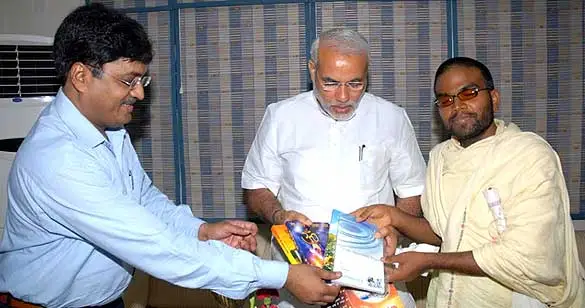
- Lalit Garg-
Narendra Modi today is not just the Prime Minister of India—he stands among the most influential global leaders of our time. His life and achievements have elevated the saga of Indian democracy to unprecedented heights. Born into a modest family, he endured the struggles of life as if they were tapasya, and emerged as a guiding light not only for Indian politics but for humanity at large. His journey is living proof that with relentless dedication, integrity, and an unyielding spirit of nationalism, one can bend the course of history itself. Modi’s rise is not merely a personal triumph; it reflects the awakened consciousness and self-confidence of a resurgent India. The indelible mark he has carved on the 21st century will remain inscribed in golden letters in the chronicles of politics, humanity, and nationalism. Beyond political revolution, he has been the catalyst for personal and social transformation. His vast personality defies comparison; any attempt to confine it within metaphors risks diminishing its magnitude. The nation today celebrates his 75th birthday with a sense of extraordinary pride.
What distinguishes Modi is his fusion of hard work and missionary zeal. Every moment of his life is dedicated to the service of the nation. He lives and breathes India—turning vision into action, and slogans into transformative policies. His mantra, “Sabka Saath, Sabka Vikas, Sabka Vishwas, Sabka Prayas” (Together with all, Development for all, Trust of all, Efforts of all) is not a mere political slogan; it is a civilizational philosophy charting a new direction for India’s socio-cultural evolution. For him, politics is not a scramble for power, but a sacred means of nation-building. History teaches us that ordinary men are shaped by circumstances, but extraordinary leaders shape circumstances themselves. Modi embodies this truth. Where others search for opportunities, he chisels greatness even from negligible possibilities.
Born on September 17, 1950, in Vadnagar (present-day Gujarat), Modi’s association with the Rashtriya Swayamsevak Sangh began at the age of eight. By 1971, he was a full-time pracharak and later rose to become BJP’s National General Secretary in 1998. His tenure as Gujarat’s Chief Minister (2001–2014) paved the way for his national leadership. Since 2014, as Prime Minister, he has redefined governance in India. Fittingly, on his 75th birthday, Modi will spend the day in Bhainsola village of Dhar district, Madhya Pradesh, where he will lay the foundation stone of the Mega Integrated Textile Region and Apparel Park—a project benefiting six lakh cotton farmers. He will also launch the Swasth Nari, Sashakt Parivar (Healthy Women, Empowered Families) campaign to strengthen healthcare services for women and children.
Under Modi’s leadership, India has witnessed epoch-making achievements. Economic reforms like GST, Digital India, Startup India, and Make in India have given fresh momentum to growth. Socially, initiatives like Swachh Bharat, Ujjwala Yojana, Jan Dhan Yojana, and Ayushman Bharat have transformed millions of lives. On national security, the surgical strikes and Balakot air strikes reshaped India’s global image as a decisive and assertive power. But perhaps his most significant contribution is the infusion of confidence in the Indian psyche—the conviction that India shall no longer lag behind. Globally, Modi has taken India’s stature to new heights. His interventions at the UN General Assembly, leadership during the G-20 Presidency, commitment at COP-26, and humanitarian outreach through the Vaccine Maitri initiative have reinforced India’s role as a responsible world leader. The vision of Vasudhaiva Kutumbakam—the world as one family—finds real expression in his policies.
I recall a personal memory from 2007. While serving as Secretary-General of the Sukhi Parivar Foundation, we organized a massive tribal convention at Kavant in Gujarat, under the guidance of Jain saint Gani Rajendra Vijayji. Then-Chief Minister Modi attended. Amidst the gathering of 1.5 lakh tribals, Gani Vijayji told him with prophetic clarity: “Now, you must go to Delhi.” That moment was not just a casual remark, but a seer’s foresight. Modi’s sensitive engagement at the event reflected his deep commitment to marginalized communities—a glimpse of the far-reaching vision that would later shape India’s destiny. Modi’s governance is also defined by human sensitivity—whether it is providing homes to the poor, raising farmers’ incomes, ensuring safety and education for daughters, or improving healthcare access. Guided by the principle of “Minimum Government, Maximum Governance,” he has streamlined administration with efficiency and accountability.
His leadership unites modernity with tradition. International recognition of yoga, culminating in June 21 as International Yoga Day, bears his imprint. The reconstruction of Ayodhya’s Ram Mandir, Kashi Vishwanath Corridor, and Kedarnath shrine reflects his reverence for India’s spiritual heritage. In Modi, modern India and ancient India converge seamlessly. Today, his name resonates among the world’s top leaders. Publications like Time and Forbes repeatedly rank him among the most powerful people globally. His personal rapport with leaders of the US, Russia, France, and Japan has elevated India’s diplomatic influence. On issues like terrorism, climate change, peace, and sustainable development, his decisive voice commands global attention.
Modi’s 75th birthday is not merely the celebration of an individual life—it is the commemoration of a transformative journey that has steered India towards new horizons. With tireless dedication, nationalist spirit, and a missionary vision, Narendra Modi is not just scripting India’s golden chapter but shaping the contours of world politics. The coming years will bear witness to a leadership that creates not only a new India but also offers the world a pathway of peace, cooperation, and inclusive progress.